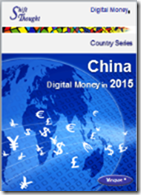It is easy to write-off what is happening in a market far away from you, and to believe that somehow your services are not affected. After working on our latest in-depth study of the People’s Republic of China (PRC), I believe this would be a fallacy. If you are offering or intend to offer digital money services of any kind, you really need to be aware of what’s happening in the most populous country in the world, and now the largest online retail market. Here’s Why ..
 On a trip to Beijing a few years ago I found myself on a main road trying to hail a cab in the evening at rush hour. After moving to several different locations and not succeeding I finally walked the long distance to my hotel and put this down to one of the most difficult travel experiences ever. Now, though, you can simply order and pay for a cab from your mobile phone, and this is just one of a set of highly convenient mobile payment services now available.
On a trip to Beijing a few years ago I found myself on a main road trying to hail a cab in the evening at rush hour. After moving to several different locations and not succeeding I finally walked the long distance to my hotel and put this down to one of the most difficult travel experiences ever. Now, though, you can simply order and pay for a cab from your mobile phone, and this is just one of a set of highly convenient mobile payment services now available.
An immense change has taken place in mainland China over the last 5 years over which we have carried out in-depth studies of this market. This has positioned China as the largest online retail market in the world, and a leader in the use of Digital Money. Services started strongly on the Internet and have now gone mobile and offline, in contrast to a number of African countries that grew on the M-Pesa Kenya model.
A strong focus on innovation
Over 2014, the downturn in traditional sectors such as real estate and slower growth in exports resulted in Q3 2014 economic growth sliding to 7.3%, the lowest growth level since the global financial crisis. This prompted the China State Council to promote innovation especially in the MSME sector, with a new 40 billion yuan ($6.5 billion) venture capital (VC) investment announced in January 20154. To place this figure in context, since first launch of the VC program in 2009, just 9.1 billion yuan was allocated.
Shift Thought sees this as one more indicator of how China is reinventing it’s positioning in the global business value chain, and digital money services are an integral part of this plan. Several large IPOs are expected as the large Chinese banks continue to restructure and go public, with a reported 5 banks doing so since Oct 2013.
Over the past 4 months Shift Thought has completed an immersive study and analysis of the highly complex China financial services market, leading to the publication of our 380 page in-depth report on every aspect of money going digital in China, including details on regulation and sizing of the various different sub-markets. I share a few highlights in this blog, as the first in our “Focus on China Series”.
Historic changes in regulations
As the market has demonstrated a voracious appetite for the new services, regulators have struggled to stay in control and also safeguard the existing licensed players in the market. In rapid succession we’ve seen regulations that brought in new third party providers, online banks and agent banking. New regulations are imminent that will have wide ramifications for start-ups and existing players alike.
First online private banks
Last month we saw the launch of the first private online bank WeBank, and there are a number of other newly licensed banks about to launch. What is interesting is the strategic potential this creates for the category Shift Thought terms as the ’Internet Tech Giants (ITG)’ of China: including groups such as Alibaba, Tencent, Baidu and others. We see huge M&A activity and rebranding activities that are readying these groups for the next level of strategic expansion over 2015.
Internet Finance
With the rapid increase in the use of the Internet, especially through smart devices, the most important trend we saw in 2014 was the meteoric rise of Internet Finance including a range of online financial services such as online payment, crowd funding, P2P Lending and others. This prompted the banks to jointly issue limits on the amount that could be transferred to investment funds such as Alibaba’s Yuebao, with P2P regulations expected shortly.
Third party providers deepen services
In 2010 the PBC released regulations to allow third party non-bank providers of payment services. Since then over 264 licenses or extensions were granted to third party payment institutions, of which over 97 supported online payment and over 30 (including the 3 mobile network operators) have permission for mobile payment services. Favourable tax treatment for online transactions has further ignited this market.
Online Payment market slows down after meteoric rise
Over the last 4 years along with massive growth, there has been stiff competition in the online payments market, with some of the providers already forced to close down. However the achievements have been phenomenal, leading to the creation of the largest online retail market in the world, and digital wallets transforming into mobile wallets.
The rise of O2O services
Both online payment and mobile payment grew strongly over 2014, with mobile payment substituting offline payment and new O2O services emerging that connect online and offline services in a manner that has been uniquely innovated in China. These O2O services allow consumers to find and use products online and offline in new ways that support their lifestyles and completely shake up the existing retail market, with strategic partnerships being formed to reposition and link retailers and online providers.
Financial inclusion
A key concern of senior Chinese Government, working with development groups this year has been for the 400 million unbanked/under-banked in China, and the 100 million under the poverty line residing largely in rural areas. Other underserved segments include migrant workers, MSMEs and unemployed workers, with recent lay-offs from state-owned enterprises (SEOs). We explore each of these segments at length, to look at the services now available to them and how these are changing – including domestic remittances, inward remittances, lending and branchless banking services.
Focus on rural areas
Some of the most interesting innovations we saw were those that are now going into rural areas, with the rapid spread of the mobile internet. In a manner that creates rich scenarios for The Digital Money Game as described in my recent book, providers are targeting multiple services over multiple channels in a bid to cement their market shares and create and grow new markets through their innovations. Our report details these innovations, such as a unique green telephone that has been adapted to support Point-of-Sale and banking transactions and was distributed free to rural households.
So why is this important to you?
This is not just important from the perspective of making an entry into the largest digital money market in the world – a feat not for the faint-hearted, I’m afraid.
As we saw Chinese goods flooding Western markets in the past, the new digital channels are enabled a new Chapter in Chinese export capabilities. We see a number of services already extending across South-East Asia. With the benefit of massive IPOs (such as Alibaba’s $25 billion, the largest IPO of it’s kind ever), providers are readying themselves to travel further afield, and you may need to compete against these new services in the US and European markets and not just in Asia Pacific.
Digital Money in China 2015
We are proud to announce the release of our globally unique report “Digital Money in China 2015”. This is essential reading for anyone who offers, or plans to offer any one the 32 key services we cover under Digital Money: including Online Payments, Mobile Payments, P2P Lending, Digital Banking, Remittances and more. Contact us today to look inside this report and learn more. Our team is ready to support you in your plans for China and elsewhere in the world. Drop us a line at contact@shiftthought.com to arrange for a call to discuss your unique requirements.


